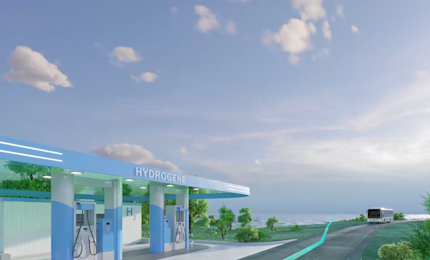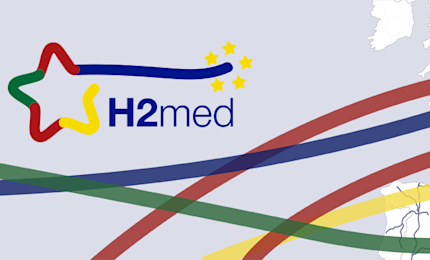Urgence gaz 0 800 028 800

Call for Expression of Interest (CEI) dedicated to the hydrogen (H₂) and carbon dioxide (CO₂) markets
In 2023, Teréga launched its first Call for Expression of Interest (CEI) dedicated to projects of renewable and low-carbon H₂ and/or CO₂ transport and storage infrastructures.
Together, let's build the decarbonised energy mix of tomorrow!
Discover the Call for Expressions of Interest results
En 2023, nous avons lancé un projet d’infrastructures dédiées au transport et au stockage d'hydrogène à l'échelle du Sud-Ouest, pierre angulaire de la dorsale hydrogène européenne. Par la suite, un appel à manifestation d’intérêt a été lancé pour préciser les besoins en infrastructures hydrogène mais également en infrastructures dédiées au transport, stockage et à la valorisation du CO₂ (CCUS).
Découvrez les résultats de ce 1er Appel à Manifestation d'Intérêt et visionnez le replay du webinaire de restitution !
Why go down the CEI route, and what is its purpose?
In its strategy to move decarbonisation from words to deeds, in December 2022 Europe created an inventory of H₂ and CO₂ infrastructure projects of potential community interest. In that process, projects put forward by Teréga (HySoW, Pycasso and H2-Med BARMAR as part of the established consortium) received significant support from tens of Stakeholders within our territory.
Teréga then decided to launch this Call for Expression of Interest (CEI), with the aim of getting a more accurate picture of the needs of the different regional, national and European actors in H₂ and CO₂ transport and storage. The results of this CEI will also help us develop the design of our projects to provide the best possible response to the needs of both actors and territories.
Why did we launch a CEI?
Teréga’s actions are based on a number of observations:
the findings of the first national consultation of actors in the low-carbon and renewable hydrogen market, launched by Teréga and NaTran in June 2021, and aimed at identifying their needs;
the “The French and Hydrogen” barometer prepared by Teréga and Harris Interactive;
the 2020 ADEME report on the development of the CCUS industry in France;
recent positions adopted by the French government and the European Union,
findings and observations shared within a variety of regional, French and European working groups in which it is involved (Gas For Climate, France Hydrogène, WG on regional competitive clusters, Club CO₂, CSF NSE etc.).
Findings of the H2 actor consultation and H2 barometer
The first national consultation of the hydrogen market reveals that this energy carrier has been identified as a catalyst for the decarbonisation of industrial activities, just like CO₂ capture, utilisation and storage (CCUS) solutions. There is also a huge appetite for it in mobility and for energy production. The consultation also emphasises that logistics remains a central concern for actors: transport and storage infrastructures appear to be essential in ensuring diversified, competitive and secure supplies of hydrogen.
Why hydrogen and carbon dioxide?
This CEI is particularly focussed on hydrogen (H₂ ) and carbon dioxyde (CO₂ ) infrastructures projects.

Hydrogen is now seen as a powerful catalyst for decarbonisation and an essential component of French and European energy sovereignty. This energy carrier could be one of the answers to the problems of climate change.
The CCUS industry (CO₂ Capture, Utilisation and Storage) associated with the development of the low-carbon and renewable hydrogen industry will help accelerate the energy transition, contribute to carbon neutrality and secure French and European energy sovereignty for the future, while at the same time maintaining and strengthening the local and French national industrial fabric. This is why Teréga is involving itself in the growth of those industries.
In addition, the “The French and Hydrogen” barometer published in June 2025 demonstrates that the majority of French people see hydrogen as an energy carrier for the future, and particularly useful in reducing carbon emissions and strengthening France’s energy independence.
Defining a framework for CCUS development
Far from being opposed to hydrogen, a number of industrial actors are envisaging carbon dioxide capture, utilisation and/or storage solutions in addition to switching over to hydrogen to support decarbonisation. Furthermore, the ADEME report identified the South West of France, and the Nouvelle Aquitaine region in particular, as one of the 3 favoured zones for CCUS project development. As it happens, the region contains depleted oil and gas fields in the Pyrenean foothills which represent potential storage capacity for carbon dioxide.
National communications at the end of 2022 identifying CCUS as one of the four national decarbonisation solutions, along with the Net Zero Industry Act, (the proposed regulatory arrangement from the European Commission with its plans to speed up the move toward carbon dioxide storage), have established a strong framework for the development of new CCS and CCUS projects in France and Europe.
The information contained in this website reflects the point of view of Teréga S.A at this stage and is made public for information purposes only and without any commitment on the part of Teréga S.A, and should not be considered as giving rise to any contractual relationship between Teréga S.A and any interested party.








